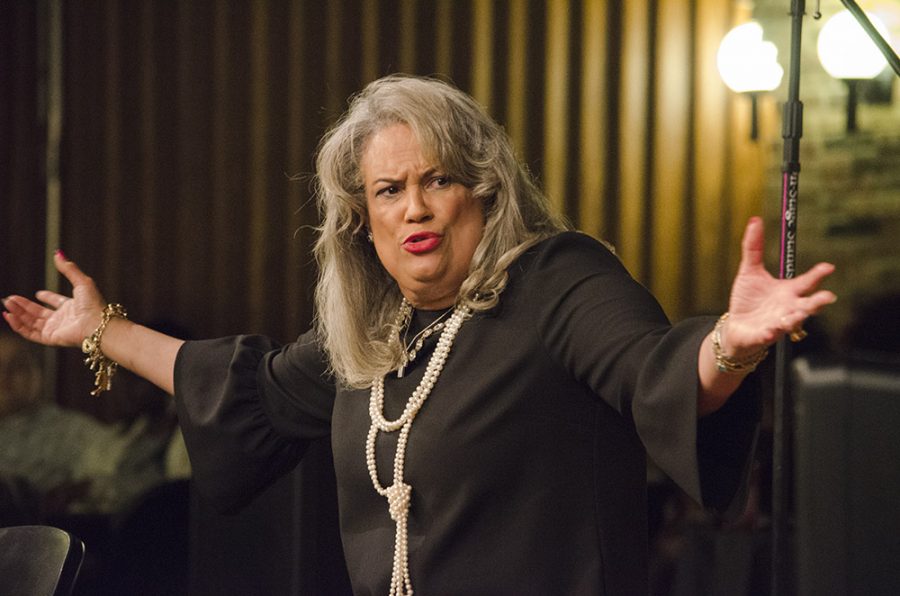AIDS activist encourages openness about syndrome
The Rev. Rae Lewis-Thornton spoke out about her personal experience with HIV and AIDS at Whispers in the Dark Monday in the 7th Street Underground at Martin Luther King Jr. Union.
February 13, 2017
Unprotected sex with a man she thought she loved turned into a diagnosis of HIV for the Rev. Rae Lewis-Thornton.
Now an HIV and AIDS activist, Lewis-Thornton spoke about her experiences Monday night while visiting Eastern for the second time.
HIV is preventable, she said, and only people can save themselves from the virus.
Lewis-Thornton discussed living with HIV for over 30 years and AIDS for 26 years.
After donating blood in the winter of 1986, Lewis-Thornton said she received a letter in the mail the March of 1987 from the Red Cross, explaining there was something wrong with her blood.
At 23, she was diagnosed with HIV.
Seven years later, the HIV transitioned to AIDS and her whole life began to crumble, she said.
When Lewis-Thornton had HIV, she only told five people she had the virus.
During Lewis-Thornton’s childhood, the men in her life who were supposed to protect her sexually assaulted her, she said.
At 17, Lewis-Thornton was kicked out of her home for arriving home 15 minutes past her curfew and moved in with a friend and her mother.
She graduated with a bachelor’s degree in political science from Northeastern Illinois University after transferring from Southern Illinois University-Carbondale.
She continued on to get her master’s degree from the University of Illinois at Chicago, but quit school with only two classes left because she developed AIDS.
The troubled childhood and development of AIDS led to Lewis-Thornton visiting psychiatrists and therapists and she became clinically depressed.
On top of depression, Lewis-Thornton has faced irregular periods, a host of gynecological problems and has had to take anywhere from three to 21 pills daily.
“I began to wonder if I could find joy in the midst of pain. I took it to God, and he began to walk me through my life,” she said.
Lewis-Thornton said God told her if she could survive being born a ‘drug baby’ and addicted to heroin, she could overcome anything.
After finding light in a dark place in her life, she began speaking about her life at high schools in Chicago.
Lewis-Thornton opened up to Susan Taylor, former editor-in-chief of Essence Magazine, about living with HIV and AIDS and was on the cover of the magazine, along with multiple others through the years.
Taylor told Lewis-Thornton she believed she had a story to tell and Taylor wanted the world to hear it.
Along with her life story, Lewis-Thornton gave advice to attendees.
She said the cycle of being with “Mr. Right” keeps going and each new man a woman finds is “the best thing since sliced bread.”
Then, the bread molds, she said.
Some girls have sex without a condom to prove something to a guy who could not care less about them, she said.
Lewis-Thornton said she was looking for someone to love her, since her family did not, before realizing she was “worth more than what was between her legs.”
Today, Lewis-Thornton has a charity page called the P*ssy Hat Protest where she knits and sells hats as a symbol of solidarity for women and women’s rights. Portions of the proceeds are donated to Planned Parenthood and the Human Rights Campaign.
She said President Donald Trump’s executive order, which prohibits U.S. money to be sent to foreign clinics dealing with family planning, has caused women in countries like Somalia and Kenya to be denied all access to HIV and AIDS treatment.
“We have created an ugly environment around HIV,” Lewis-Thornton said.
She said she encourages people to stop the stereotypes of HIV and AIDS and to break the stigma around the diseases.
Kennedy Nolen can be reached at 581-2812 or kdnolen@eiu.edu




































































